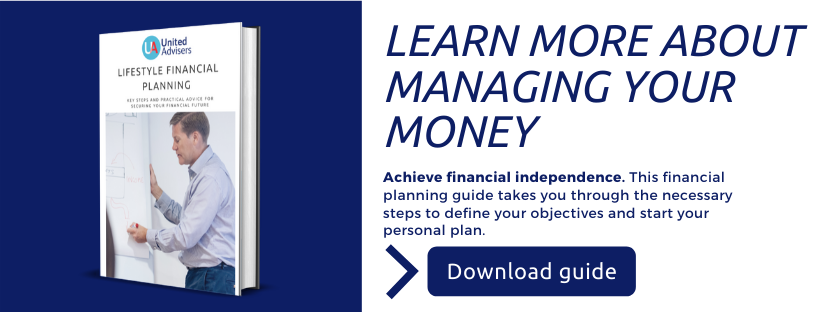Questions asked by your current adviser can provide real insight into how they work. Most financial advisers concentrate on selling you a product to fix a ‘problem’ rather than tackling proper financial planning that focuses on the most important thing – you.
Most people value a service that relates to their goals and dreams. They want to avoid being recommended a financial product that isn’t in their best interests. The majority of expats seeking financial advice want clarity around decision-making and how their financial future looks.
Real financial planning revolves around you. Your financial plan should be more than a series of product recommendations; it should take your net worth, asset growth and financial goals into consideration.
To create your tailored financial plan, your adviser will need to spend time getting to know you and what you want to achieve. They should do this by asking you questions about your current lifestyle and the lifestyle you hope to have in the future.
A great financial adviser’s questions should aim to understand what makes you tick, your aspirations and your concerns.
1. What made you decide to seek independent financial advice?
Expats seek independent advice for different reasons, such as:
- they are short on time
- they wish to have an expert opinion on a specific subject
- a recent move has changed their tax status
- their family dynamic has changed and they need to recalibrate their finances
- they have experienced a shift in their financial goals.
A good adviser should seek to understand where you need support and whether they are the best match for your needs. Once that’s established, they should seek to better understand your personal circumstances and money motivations. After all, your adviser is in the people business and should have an interest in you and your motivations.
Getting to know each other is essential and should be enjoyable. It’s important you feel comfortable enough to speak freely about your career, family status, work history and anything else you deem important.
Fundamentally you will be placing a lot of trust in your adviser and you want to have a good affinity with them. If you do not enjoy the interactions with your adviser or feel you can’t be 100% honest about your current situation, that is a common sign the relationship isn’t as good as it could be.
2. What are your financial goals and objectives?

There is no point having a financial plan if you aren’t sure of your goals. And if you don’t know where you’re going, it’s tough to know how to get there.
We always say ‘a secure future doesn’t happen by accident’. By asking this question, your financial adviser can help you better understand and articulate your goals, values, needs and expectations.
This question is intended to discover what you wish to accomplish with your money in the short or long term. Ultimately, your answers help your adviser to help you. Be honest with yourself and your adviser as you answer this question. The more honest you are, the more it will help with every step in the financial planning process.
Don’t worry if you can’t perfectly articulate some of your financial goals at this early stage of the process. Goals can – and do – change. However, it helps to know as early as possible whether or not you are heading towards the wrong financial goals.
If you are in a relationship, it is also important to check that you and your partner’s goals are aligned.
3. Besides money, what else is important to you?
It’s important to remember that money doesn’t exist in a vacuum. This question helps you and your adviser to explore what matters most to you and helps align your money with those values.
Dick Wagner, in his book ‘Financial Planning 3.0’, put it best when he said:
“So much of the financial planner’s work takes place in conversations about feelings, dreams, meaning and purpose.”
This is a good time to answer questions such as ‘what hobbies and activities do you enjoy most?’, ‘what is on your bucket list‘ and ‘what legacy would you like to leave?’, amongst others we have included in our Lifestyle Financial Planning guide.
It’s also a good time to consider whether there is anything in your life now or that you can see coming that will have a major impact on your finances.
Issues that cause you stress can affect your financial life, so it’s important to talk through them. For example, concerns about your children’s education, your parents’ declining health or concerns that you’re not spending enough time with family. We understand discussing such concerns can be a little uncomfortable. However, talking about this now and answering the difficult questions will put you in a position to make reasoned decisions about your present and your future.
This question from your adviser is therefore an opportunity to articulate your values if you’ve not already done so.
It helps to figure out what matters to you and helps your adviser align your financial planning with your values.
4. How do you picture your life one year, even five years, from now?
Many people think financial planning is just about retirement and estate planning, but for some retirement may be 20 or 30 years down the road.
While catering for life after retirement is no doubt a big part of anyone’s financial picture, your financial landscape encompasses far more than that.
This question helps define your short-term goals and flesh out your medium to long-term goals. Many people are unaware that financial advisers can help navigate life events like a home purchase, starting a small business, having children or going through a divorce.
All these things play a role in your overall financial wellbeing. A good planner helps you address want you want and need now, as well as what you need to create the life you want in the future. By starting this conversation, your adviser is setting the tone for building a long-term relationship that will help you realise your short, medium and long-term goals.
5. What concerns you most about your finances?

This question aims to discover the more day-to-day type of financial thinker you are and address the financial stress we all carry to some degree.
An essential part of your adviser’s job is to help you arrange your finances to minimise that stress. If you are regularly losing sleep over debt worries, for example, tell your adviser. Knowing this helps your adviser recognise that it is vital for you to reduce your debt. Though it may seem more logical to focus on investing while slowly reducing debt, tackling debt head-on may be more beneficial to your overall wellbeing and should, therefore, be a significant financial goal.
Real financial planning helps you live well with the money you have now and in the future. To do this, your planner should address your most pressing concerns. It is really important to be completely transparent about your concerns and financial standing at this point to ensure that you get the best possible advice.
6. How do you feel about your current financial plan?
You need to feel reassured that your financial plan will help you achieve your current and future goals. A good financial planner will help develop a plan that suits you and your lifestyle.
They will also help keep you accountable to achieving your goals and, when something happens in your life and you have a question about how that could impact your financial future, they are there to help you make positive and proactive decisions.
A great financial planner will help you understand if you need to save more or help you find the confidence to spend knowing your financial future is secure. How do you feel about your plan?
7. Have you included your family or partner in these conversations?
Above we touched briefly on making sure you discuss your financial goals with your partner if you’re in a relationship. You don’t want to make it to retirement only to discover that you each have different visions of how retirement will look for you as a couple.
Even within families, different family members can have very different ideas when it comes to how they wish to live. Perhaps you’re focused solely on creating more wealth while your children want to spend more time together as a family.
There is a lot of value in talking as a family about financial decisions and involving them in the financial planning journey with your adviser. After all, some of the most important financial decisions can have repercussions across generations, which is why your adviser will ask this question.
Next steps on your financial planning journey
We believe it’s essential you have the clarity a roadmap to financial confidence brings so that you’re equipped to achieve what you need most – peace of mind.
Creating and maintaining a useful financial plan takes time and most people need some degree of professional help to achieve this. We’re here to provide just that.





